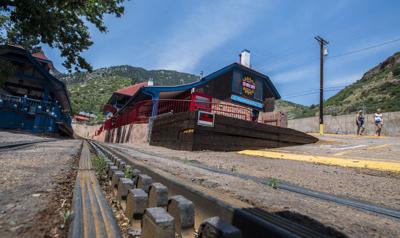MANITOU SPRINGS - Before Manitou Springs strikes a deal expected to keep the Pikes Peak Cog Railway open for decades to come, the City Council wants to know exactly how much Cog owners will contribute to local projects.
The council gave unanimous preliminary approval June 12 to an agreement with Oklahoma Publishing Co., parent company of The Broadmoor hotel and the Cog Railway. The pact would give the ownership group two tax breaks it has said it needs to invest $75 million to $95 million to rebuild the railway.
The agreement, slated for final council approval June 26, requires Oklahoma Publishing to pay Manitou Springs $1 million from 2018 to 2019 to make up for the tax revenue shortage expected since the Cog's closure.
Oklahoma Publishing also would help the city reduce congestion exacerbated by Cog visitors and support parking solutions, such as increased parking capacity at Hiawatha Gardens.
Now city staff is drafting a provision that would specify the Cog's commitment to local projects, officials said at a Tuesday night meeting at Manitou City Hall.
Mayor Ken Jaray, who joined the discussion via phone, said the provision would include a minimum amount that the Cog would contribute. He said he hoped it would be $500,000 to $1 million.
Under terms of the current proposal, the city also would waive its use tax for equipment and machinery related to the railway's rebuilding and cap its amusement tax at $500,000 a year for the Cog and any other business, allowing the company to keep any revenue above that cap.
The cap would increase by at least 1.5 percent every four years and would remain in place 50 years.
Until this spring, the Cog had for more than 100 years run a scenic trip from a depot on Manitou Springs' western edge to the summit of America's Mountain. But in March, Broadmoor President and CEO Jack Damioli announced that the aging railway had "run its useful life."
An analysis since found that nearly $100 million would be needed to restore the system, rebuilding the track and expanding, remodeling or even demolishing the railway's Manitou depot.
The unexpected closure left Manitou Springs officials grappling with a projected annual shortfall of about $600,000, consisting of amusement taxes levied on Cog ticket sales and sales tax collections from Cog patrons who eat, shop and stay in town.
If Manitou Springs approves the agreement, work on the Cog could begin in August with a partial reopening in May 2020.
But Gary Pierson, president and CEO of Oklahoma Publishing, has said the company will have to work with European contractors to ensure that they can supply the project materials at the cost they've projected.
Council members have echoed Pierson's sentiment that the deal is a "win-win" for the Cog and the city.
"I'm not going to say no to this," Councilwoman Becky Elder said at the meeting. "We have to keep the train moving for the city."
Resident Dale Latty protested, though, saying council members overestimated residents' support for the deal, and the company was pressuring the city to hastily pass the pact.
Latty said he and other residents are concerned about the long-term effects on the city budget, particularly with the cap on the amusement tax.
"What if the railroad doubles its ridership in the next five years? Where does that leave Manitou Springs? It leaves us nowhere," he told the council.
How much revenue the Cog can keep because of the amusement tax cap will depend on ticket prices and ridership numbers, said Interim City Manager Malcolm Fleming.
Jaray told Latty that tourism brought by the Cog and other opportunities from the agreement will make up for the ticket-sale taxes that the city doesn't see because of the cap.
"We're not left with nothing," he said. "We're left with a railroad that brings in millions of dollars."
Pierson, who spoke with The Gazette afterward, said the Cog has good reason to push the city to make a decision.
"If this project takes longer than two years, it's going to have highly detrimental effects on the region," Pierson said.
A special meeting is tentatively scheduled for Monday to give the council a final chance to review the agreement in an executive session if necessary.
Oklahoma Publishing and The Broadmoor are owned by the Denver-based Anschutz Corp., whose Clarity Media Group owns The Gazette.




 Your Privacy Choices
Your Privacy Choices